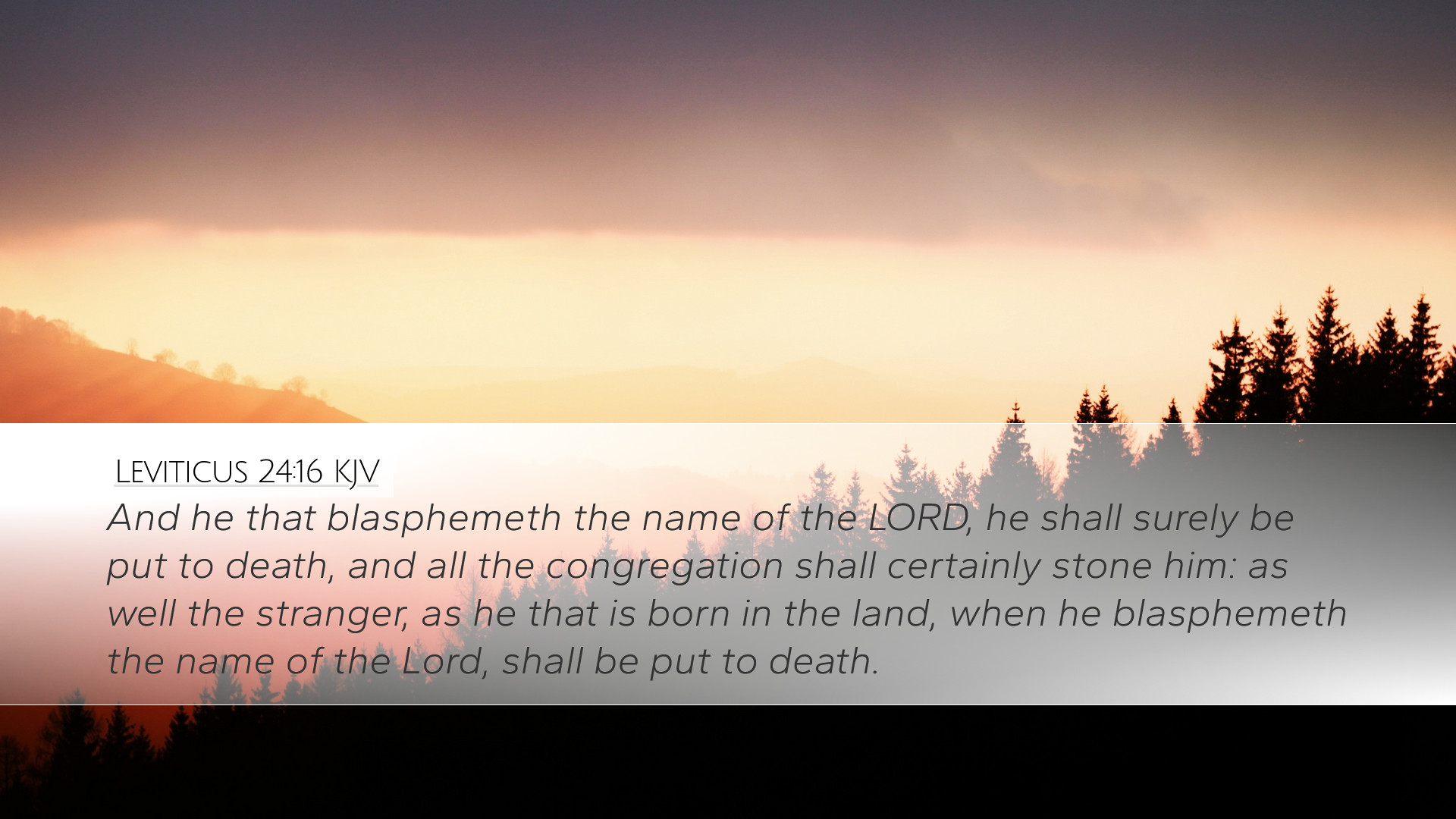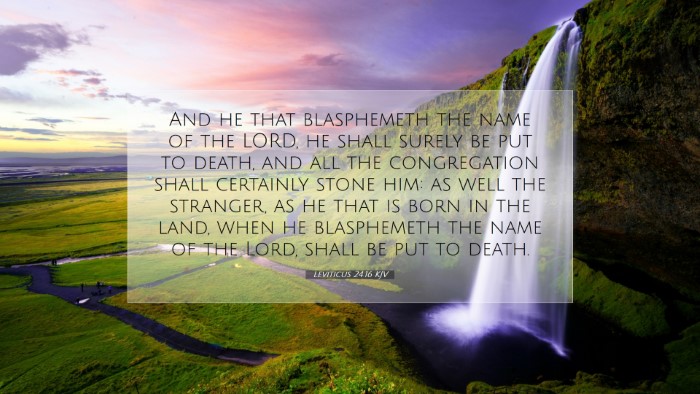Commentary on Leviticus 24:16
Verse: "And he that blasphemeth the name of the Lord, he shall surely be put to death, and all the congregation shall certainly stone him: as well the stranger, as he that is born in the land, when he blasphemeth the name of the Lord, shall be put to death." (Leviticus 24:16, KJV)
Introduction
Leviticus 24:16 serves as a pivotal verse in establishing the sanctity of God's name and the seriousness with which blasphemy is treated in the Law of Moses. The injunction against blasphemy reflects the importance of God's holiness and the grave nature of transgressing His divine character. Through this commentary, we will explore insights from historical biblical scholars including Matthew Henry, Albert Barnes, and Adam Clarke.
Matthew Henry's Commentary
Matthew Henry emphasizes the notion that blasphemy against the name of God is not merely a personal offense but a societal transgression. He highlights how the name of God represents His character and glory, and to blaspheme it is to attack the very foundations of faith and morality.
- Severity of Punishment: The penalty of death, as prescribed, underscores the utmost seriousness with which God views blasphemy. Henry points out that this reflects the covenant nature of the relationship between God and His people.
- Inclusivity of the Law: Both the native Israelite and the foreigner are subject to the same law—a reflection of God's justice regardless of one's status. This implies that the reverence for God's name transcends cultural and social boundaries.
Albert Barnes' Commentary
Albert Barnes provides a detailed analysis of the term "blasphemy," offering insights into its implications. Blasphemy is not seen only as a verbal assault but encompasses actions and attitudes that display irreverence towards God.
- Nature of Blasphemy: Barnes affirms that blasphemy shall include any act that denies or disrespects God's omnipotence and holiness. It's a direct affront to the divine status of God, making the act both audacious and dangerous.
- Judicial Authority: The requirement for communal execution by stoning aligns with the importance of community accountability in maintaining holiness. Barnes notes that public acknowledgment of sin is crucial in a covenant community.
Adam Clarke's Commentary
Adam Clarke provides theological elaboration on Leviticus 24:16 by discussing the historical context of Israel's legal and moral structure. He reiterates that blasphemy carries weighty consequences due to its implications on community faith and coherence.
- Moral and Spiritual Decay: Clarke links blasphemy with societal decline. He argues that allowing blasphemy to go unpunished may lead to further moral decay within the community, emphasizing the necessity of strict measures.
- Reflection of God’s Character: Clarke points out that the punishment is not just punitive but restorative; it was meant to uphold God's honor in the eyes of the people. This underscores that God's character demands that He be revered, and the community's action serves as a witness to that belief.
Theological Implications
The theological implications drawn from Leviticus 24:16 extend beyond ancient Israel. The verse serves as a basis for understanding blasphemy in contemporary Christian ethics.
- The Holiness of God: God’s holiness is a central theme that informs the moral fabric of human relationships. Every act of blasphemy diminishes the understanding of God's sanctity and, thus, the witness of the believer.
- Judgment and Mercy: The punishment reflects the dual nature of God's justice; even as His name is sanctified, His mercy is also an essential aspect of His character. The severity of the punishment raises questions about the relationship between divine justice and human sinfulness.
Practical Applications for Believers
For pastors, students, theologians, and scholars, the essence of Leviticus 24:16 calls for a careful contemplation of both personal reverence and communal accountability when it comes to God's name.
- Personal Conduct: Believers are encouraged to conduct themselves in ways that honor God's name, recognizing the weight that comes with being a representative of Christ in the world.
- Community Responsibility: The necessity of community vigilance in upholding holiness suggests that believers should hold one another accountable, fostering an environment where God is revered.
Conclusion
Leviticus 24:16 offers profound insights into the nature of divine authority and human responsibility regarding the holy name of God. By examining the perspectives of scholars such as Matthew Henry, Albert Barnes, and Adam Clarke, we glean a deeper understanding of God's expectations for His people and the behaviors that contradict those expectations. The church today must continue to uphold the sanctity of God’s name, recognizing that to live in acknowledgment of His holiness is to embrace a life marked by reverence, community engagement, and moral integrity.


